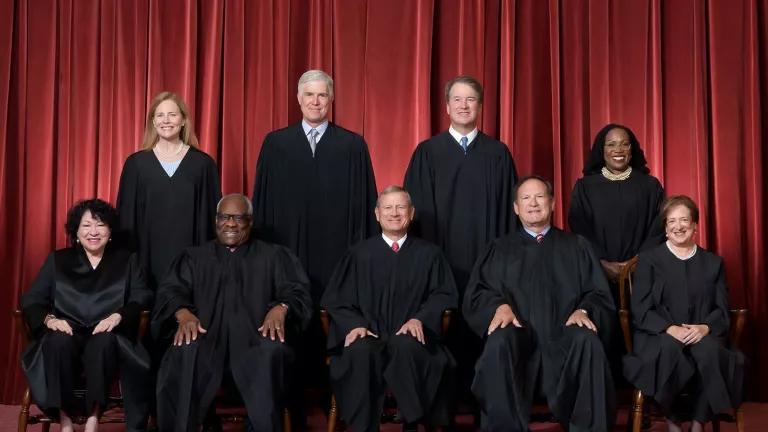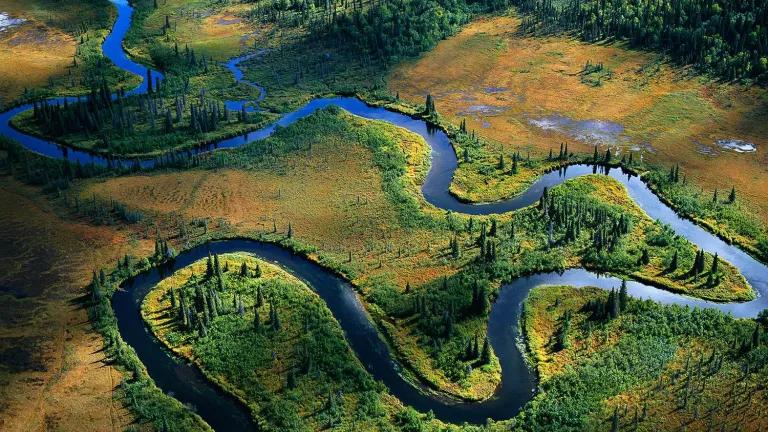When I was vacationing in Alaska in July, I saw a man wearing a T shirt that trumpeted freedom and the defeat of tyranny while displaying the international symbol for forbidden over the words regulation and mandates. The wearer of the shirt seemed a pretty ordinary Alaskan in his conversation: he worked in fishing-related businesses and profited from the summer tourist trade.
What would it take to get him to appreciate the real relationship between regulation and mandates on one hand and the victory of freedom over tyranny on the other?
And what would it take for him to recognize that the job he loves and depends on wouldn’t exist without regulation and mandates?
In Alaska, the whole economy of the coast depends on salmon (and to a lesser extent other fish). But see below. Tourists spend hundreds of dollars a day to hire fishing vessels for sport fishing, and go on “flight-seeing” trips for even more money to see bears—whose main food is salmon.

Brown bears clamming (salmon have not arrived yet)
©David B. Goldstein 2012
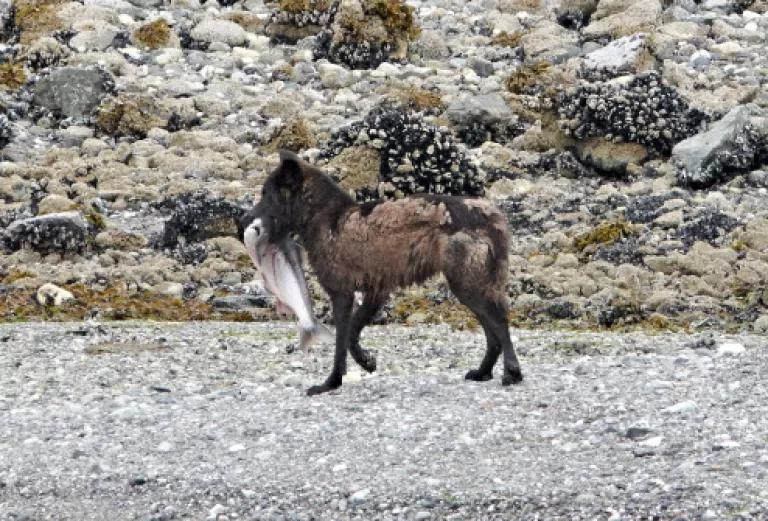
Wolves also eat salmon
©David B. Goldstein 2012
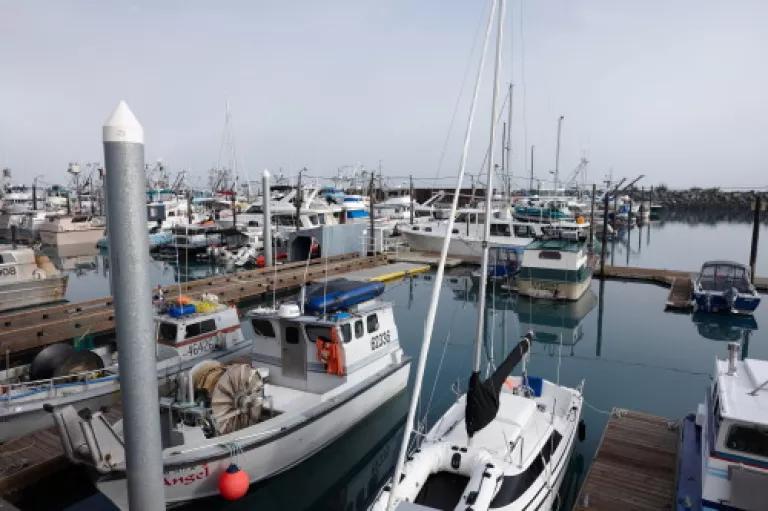
Large fishing fleet in the small town of Whittier
©David B. Goldstein 2012
So what would the Alaska economy look like with no mandates and no regulation?
For starters, it wouldn’t have much of a fishery. For every small fisherman who can make a decent living catching salmon or halibut or cod, there is potentially a giant factory ship, probably operated by foreigners, that can use much more damaging techniques to catch more fish at lower cost. And the salmon fishery depends on free-flowing streams and rivers and unpolluted headwaters for spawning. Without regulation and mandates, there would be so few fish that they would not support the sort of small-business-based economy we saw in South and Southeast Alaska.
Regulation = Economic Stability
The observation that regulation and mandates are needed to support freedom is not a left-wing idea: it was expressed clearly in Friedrich Hayek’s book “The Road to Serfdom” which is high on the Conservative reading list. Hayek argues that free markets are better than socialist planning because in a planned economy, people are at the mercy of the whims of individual bureaucrats who can make decisions that limit their freedom, while in a market economy the decisions are made by a fixed legal process, whose outcome can be predicted more or less reliably, and whose limits are equally apparent and equally applicable to all.
But what do we mean by a fixed legal process? It is not just the precedents used in lawsuits. It means a set of regulations and mandates that make it easy to follow the law by telling market participants just what they need to do to avoid every little problem ending up in court.
In both cases—government economic planning and free markets-- ones freedom is limited, but in one case the limits are arbitrary and personal where in the other they are established in advance and are the same for everyone. This distinction is important to Hayek--and to me--because everyone’s freedom is limited in a society of more than one: people are not free to commit crimes. The question is whether these limits are fair and democratic—such as crimes being defined by an open legal process-- and enforced equally. Fair and stable rules make Hayek (and I assume most people) more comfortable than submitting to the will of an un-accountable official.
And these fair and stable rules are also the very substance of mandate and regulation.
Without mandates and regulations, the wealthy or powerful can set arbitrary and personal rules just the same as tyrannical governments can. Without regulation, a wealthy and powerful fishing trade association dominated by a few big companies can fix prices at a level that will drive the small fishermen out of business. Without mandated limits on catch, a large company with a short term perspective can overfish and leave the stocks permanently depleted, or can erect a dam that prevents salmon from spawning, or can open a mine that pollutes the spawning grounds, and in all these cases, the small fisherman has no recourse.
More broadly, without regulation, a company can sell stock or bonds based on false accounting, cheating its investors; or can sell dangerous food or snake-oil medical procedures. A bank can lend money to people who are not good credit risk, and, when it collapses, bring the whole economy down with it (while the owners and managers of the company pocket the returns from the good times). Or the bank can refuse to lend money to people who, say, want to buy a home and can afford it but have a statistical profile that looks like those of people who can’t.
Without regulation and mandates, all but the very most powerful are at the mercy of those higher on the food chain who can make economic decisions for them at whim and without following any rules.
Back to Alaska….
I mentioned that fishing is the cornerstone of the economy of coastal Alaska. But it is not the biggest industry in the state, even counting tourism as part of fishing. The biggest industries are extractive: mining and drilling.
For the past century or so, these industries have not been good for Alaska: they have harmed the culture and lifestyle of Alaskans as well as the environment. That’s not me, the environmentalist, asserting that, but what I was told by an Alaskan retiree who I met on the ferry, who spent his whole career in the oil drilling industry as an engineer. Perhaps with adequate regulation and mandates, future extractive activities could be better than that.
But what’s worse: some quick trips through the local museums have shown that mining and drilling create a boom-bust economy, not just recently but throughout Alaskan history. And many of the jobs were not ones that most conservatives would have liked creating: we learned in Ketchikan that Alaska only outlawed prostitution in 1954.
We sailed on the MV Kennicott, named for Robert Kennicott, a biologist working for the Smithsonian who explored the Yukon region and died there in 1865, who accidentally discovered the world’s largest copper deposit. A company bearing his name (though misspelled) mined the metal and created huge revenues—for awhile. But the mine closed around World War II and all the associated jobs and prosperity disappeared. Similar stories are found concerning gold and other materials, and are also presented concerning oil.
Without regulatory protection, Alaska will suffer more of the disruptions of booms and busts, along with the environmental and cultural disruption that extractive industries always cause (unless regulations require mitigating these impacts). These impacts will disrupt the biggest source of jobs that is sustainable and that provide work that the people I met actually enjoyed doing: fishing and related tour-guiding.
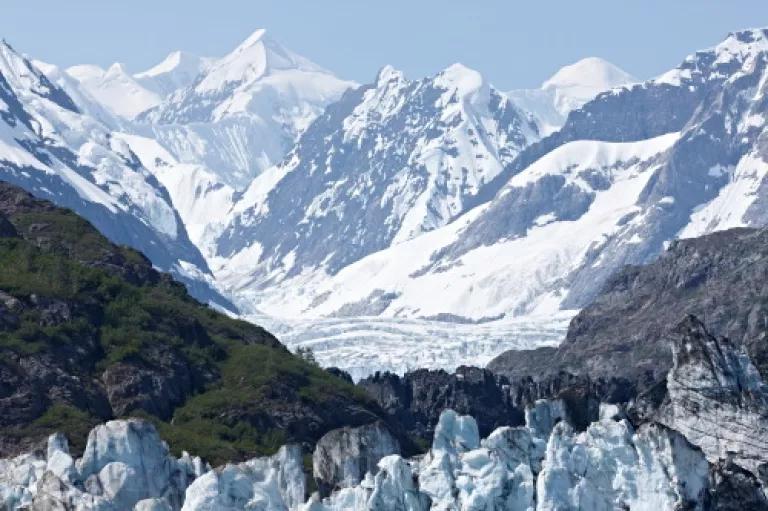
Some of what tourists go to Alaska to see
©David B. Goldstein 2012


